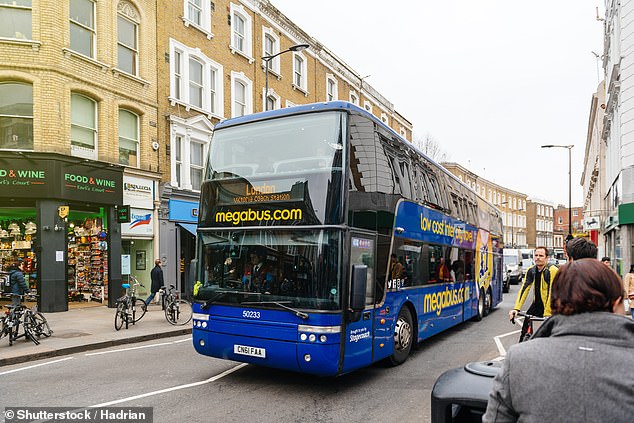Explosive Study Exposes Travel Companies Ignoring New Rules on Hidden Add-On Costs — Are They Breaking the Law?
- EXPLORE FURTHER: As a travel editor, here are the things I always bring with me
Everyone understands how irritating it can be when we shop for flights and vacations online.
You’re reeled in by a very low price – and then end up with a much bigger figure by the time you get to the check-out, thanks to extra admin and booking fees.
The Digital Markets, Competition and Consumer Protection (DMCC) Act – a legislation implemented in April – aimed to eliminate those annoying additional charges.
However, in a fresh inquiry, Which? has found that many well-known travel brands, including Megabus, Wowcher and loveholidays, are potentially breaking the law by ignoring or at least dragging their feet on the new rules.
In the most extreme cases, travellers could find themselves paying hundreds of pounds more than the upfront price.
When looking at booking a hotel resort using comparison sites Kayak and Trivago, Which? found a huge variation in prices between the cheapest and most expensive hotel deals, including at the Excalibur Hotel in Las Vegas .
Experts from Which? discovered that a seven-day trip in July would cost only £371 with loveholiday, whereas Booking.com and Hotels.com quoted prices around £700.
Loveholidays stated that their price covers both hotel fees and local tourist taxes.

When Which? reached out to loveholidays, the company acknowledged that the quoted price didn’t cover the complete hotel fees, which were factored in by Booking.com and Hotels.com.
Instead, there was a staggering £257 extra to pay when you checked out.
Excalibur, similar to numerous hotels in Las Vegas and many across the United States and the Caribbean, imposes a 'resort fee.' This is a compulsory charge for amenities you might or might not utilize.
This enables them to promote a upfront payment price, followed by an additional significant amount when you depart.
This practice is legally permissible—despite significant criticism even in the US—but according to the new DMCC Act, websites targeting the UK market must inform their customers about such charges upfront.
Which? reported that following contact from the consumer advocate in February, Loveholidays made minor adjustments to their listing. They removed the statement claiming their price covers all hotel fees and added the clarification: “Depending on your hotel’s policy, you might have to pay extra charges.”
Which? also asserts that LoveHolidays stated they would guarantee compliance with upcoming regulations before their implementation. However, when the consumer advocate group verified in May, it appears these measures were yet to be put in place.
It states: 'In contrast to numerous competitors, it failed to display the resort fee for the Excalibur.'

Loveholidays' listing currently states: "Your hotel might impose extra charges, payable on-site," yet it fails to disclose that these mandatory fees can increase your accommodation costs by several hundred pounds.
When Which? contacted loveholidays again, the holiday site apparently didn’t give a statement but did suggest it was looking into showing resort fees in its prices.
Until it does, Which? says it believes the company is breaking the law.
Experts at Which? add: ‘Some other less well-known sites are also failing to include resort fees but most of the big ones - including Booking.com, Expedia, Hotels.com and Lastminute.com do include them.’
Which? found a similar problem when it looked at holiday deals on discount website Wowcher.
A week’s summer holiday to Malta, which initially appeared to cost £1,278 had a £9.99 'administration fee’ at the point of checkout.
In February, Wowcher informed Which? that they were reassessing their administrative fee implementation process and pledged to ensure ongoing compliance with all relevant laws.
Nevertheless, as of May, Wowcher was still levying a £9.99 administration fee, reported Which?.

In the meantime, when Which? investigated budget bus company Megabus, they too uncovered several problems.
The specialists first discovered a single-trip ticket from London to Birmingham priced at just £5.99 on the Megabus site; however, they were then charged an additional £1.50 booking fee during checkout – causing the total cost to rise by approximately 25% to £7.49.
In February, Megabus informed Which? that they would adhere to any new regulations implemented.
Nevertheless, when Which? revisited the site in May to check for a trip on the Megabus.co.uk platform, they found that a £1.50 booking fee was still displayed right before completing the payment process.
The experts at Which? comment: 'The charge isn’t disclosed at any point during the buying process on the website.'
'on the National Express site, there’s a disclaimer stating that the advertised price does not include a £1.50 booking fee. This is more transparent than what Megabus offers.'
Megabus told Which? that it’s 'committed to offering transparent and affordable travel' and it would update its prices to ensure the booking fees are clearly shown at the start of the booking process by the end of May 2025.
Under the DMCC Act, the Competition and Markets Authority (CMA) has the authority to impose penalties of up to £300,000 or 10 percent of global revenue— whichever amount is greater —without needing to proceed to court.

The Trading Standards authorities are also capable of enforcing these regulations.
During the initial 12-month period after implementation, the CMA has stated that it will focus on blatant violations of the law and practices that cause significant harm to consumers.
This encompasses 'costs that remain concealed until much later in the purchasing journey,' along with various other problems.
Quentin understands that travel companies continue to employ questionable additional charges to extract extra funds from consumers, potentially violating legal standards.
Rory Boland, Editor of Which? Travel, said: 'Sneaky fees and add-ons can significantly change the final price people pay for holidays and the difference between the advertised price and the final total can reach hundreds of pounds in the worst cases.
‘We’ve uncovered examples of brands ignoring new rules that are there to protect customers from being hit with unexpected fees and we believe they could be breaking the law.’
In response to Which?’s study, Megabus said: ‘We are committed to offering transparent and affordable travel for our customers.
‘We are currently making updates to our website - due to be completed by the end of this month - to ensure that all fees, including our £1.50 booking fee, are clearly highlighted at the start of the booking process.

‘We fully support efforts to improve transparency in pricing across the travel industry and will continue to ensure our practices align with the latest regulations.’
'Wowcher has made several modifications to its website to guarantee adherence to the provisions of the DMCC Act.'
This has involved offering an estimation of its varying administrative fees within its price breakdown, displayed visibly and prominently on our deal pages before customers proceed to checkout.
'Our aim is to guarantee that our website remains clear and open for customers, enabling them to confidently make purchasing decisions on the Wowcher platform.'
Read more
Post a Comment for "Explosive Study Exposes Travel Companies Ignoring New Rules on Hidden Add-On Costs — Are They Breaking the Law?"